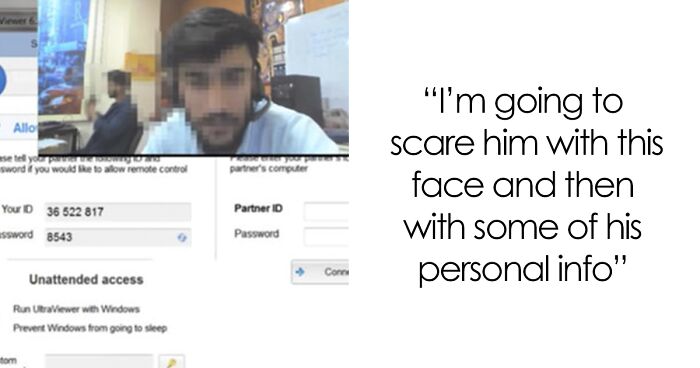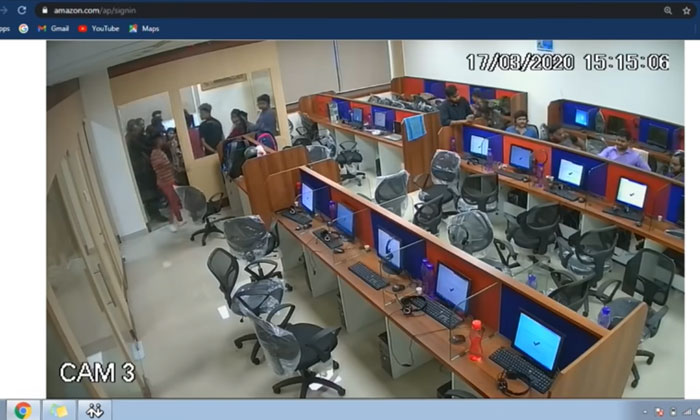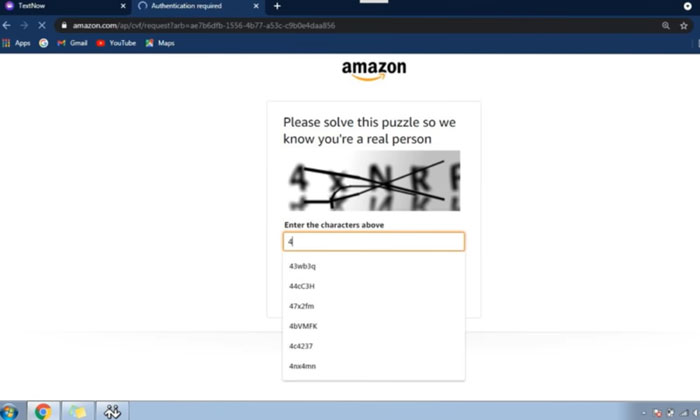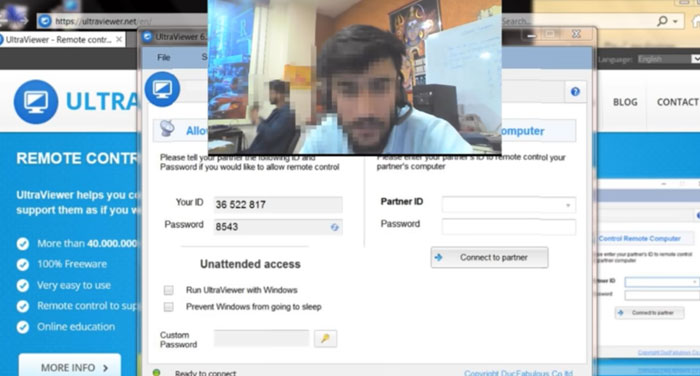
Guy Shows Scammer The View From His Own Webcam In A Viral Video That Has Nearly 15 Million Views
InterviewIf you play with fire, you’ll get burned. While scammers might think that they’re at the top of the food chain and everybody else is their prey, this isn’t always the case. There are various tech-savvy Robin Hoods on the internet who are protecting us from scammers and fraudsters by exposing them with advanced methods. And Scambaiter, from India, is one of these everyday heroes.
In a viral video that’s gotten nearly 15 million views in less than a month since being published, Scambaiter demonstrated how he spooked a scammer by showing him the view from his webcam. His reaction—priceless. Scroll down to check out how everything went down and to have a look at the full video. Like what you see? Consider following Scambaiter’s social media pages to see his latest skirmishes with various scammers.
Bored Panda reached out to Scambaiter to understand the world of scambaiting and avoiding scams even better. ” I would suggest staying cautious. Approach everything that looks too good to be true as a scam and before you do anything that you don’t really feel comfortable with, call someone that has knowledge on the subject for some advice,” the YouTuber warned. You’ll find the full interview below, dear Pandas.
More info: YouTube | Twitter | Discord | Patreon
“The scam they run is very primitive and simple”
“If someone ever calls you from a big company asking you for questionable stuff like remote access to your computer, gift cards, or your Social Security Number, then just know that that is a scam. Big institutions like Amazon, Microsoft, the SSA and Geek Squad will never make robocalls to you,” Scambaiter was upfront with Bored Panda. Listen to your gut!
“If you feel like it is real, ask them if you can hang up the phone and call back on the number that is given to you on the official webpage of the institution in question. If you know it is a scam and you want to get rid of them, tell them you don’t have internet at your home, you’re not interested and you know that they are scammers. Or perhaps you could try to mess with them!” the expert on scams gave us some awesome advice on what we can do if someone raises our suspicions.
“First, this scammer sends an email. This email tells people that they have ordered something and if they haven’t done this, which obviously they haven’t, they should call the Amazon refund team”
“Once you call this number, you get connected to a call center in India where people like Kedarnath will pick up”
“‘We are going to send you a verification code, please help me with the verification that you are going to receive.’ What this scammer is doing here is that he is pretending to send the victim a verification message from Amazon. Well, the message is an actual message from Amazon but it’s to reset the password”
“Once the scammer is in and he has changed the victim’s password, he starts sniffing around to the information and looking for an attached credit card to the Amazon account that he can buy himself”
“By hacking into the victim’s Amazon account through a very believable way of social engineering, the scammer gets all of the victim’s information. He pretends like this information is coming from his Amazon database and that’s why victims start trusting these guys”
“This victim has paid the scammers 1,000 US dollars”
“I decided to run a GPS scan on a reverse proxy on this camera’s network and those coordinates take us to the very north of New Delhi”
Unlike many other scambaiters, the YouTuber doesn’t have a revenge story that kicked off his crusade against charlatans. “I just got inspired by other YouTubers,” he opened up to Bored Panda.
“I think I first discovered scambaiting somewhere late 2017 when I found a YouTuber called Kitboga that was wasting the time of scammers by pretending to be a real victim. I then stumbled across another scambaiting YouTuber mid 2019, Scammerrevolts. He went a step further than just wasting time, he actually deleted the scammers’ files in an entertaining way,” he said.
“When I saw that I wanted to give it a go, I started my own YouTube channel and really enjoyed doing it. After a while, ‘just’ deleting files became a bit boring to me so I went a step further by, instead of deleting files, planting them. This then gives me full access to the machine of the scammer. This procedure is described by many as ‘reversing the connection’ and it requires a lot of social engineering which can get very hard sometimes if the scammers know what you’re up to,” the tech expert gave us an insight into the exciting world of baiting scammers.
“There was only one guy with that information and the face on Facebook matched up with that from his webcam”
“I’m going to scare him with this face and then with some of his personal info”
“I know everything about you, I know what you do, I know everything about your company. The guy that’s sitting next to you, man. Just answer some questions for me, bro, I can see you right now”
“I tried to talk to him through voice chat of my remote access tool but he didn’t come back, he didn’t want to answer any questions”
“Don’t run away from me I can see you, bro”
Within the past couple of months, Scambaiter’s channel has been grown extremely rapidly. “My end goal for this year was 100,000 subscribers which I already achieved on February 26th. My goal then shifted towards 500,000 subscribers on my channel which I then achieved on April 28th. Now, the most obvious and most special milestone to achieve next is 1 million subscribers.”
However, the YouTuber acknowledges that his channel’s growth can be unpredictable, so pretty much anything can happen. “In terms of other things I would like to achieve with my channel this year: I would love to collaborate with other scambaiting YouTubers and try to gain access to the CCTV system of a scam call center,” he shared some of his plans for 2021.
Scambaiter also gave all of us a heads up in case we wanted to start baiting scammers ourselves. “Make sure you watch some videos on the topic first and also make sure that you are never using your real phone number, real devices, and your real IP address. I highly suggest watching YouTubers like myself, Jim Browning, and Kitboga to learn about scams and/or scambaiting.”
You can watch Scambaiter’s full video right over here!
Scambaiter created his YouTube channel back in 2015 and since then has amassed a total of a whopping 31 million views. What’s more, after somebody posted a shorter version of the video on Reddit, they got 109k upvotes and a metric ton of digital awards, too, helping further spread the legend of the scammer hunter.
The Times of India explains that scambaiting happens when vigilantes target fraudsters who try to weasel money out of their victims. These everyday heroes pretend to be interested in the scammers’ schemes, only to later pull the rug out from under their feet, waste their time, or report them to the authorities once they have their details.
A lot of scams come out of India, so the software engineers and cybersecurity researchers who decide to give them a run for their money often focus on this country on forums and on message boards.
In an earlier interview, I spoke about how to avoid scams with one of the moderators of the r/Scams subreddit. They pointed out that educating ourselves preemptively is one of our greatest weapons in avoiding frauds.
“Once you fall for a scam, there is usually not much that can be done, but if you take a short amount of time now to learn more about scams, you can save yourself money and hassle in the future. An ounce of prevention is worth a pound of cure,” they said.
“The more people who are scam aware, the fewer income streams scammers will have. You’re never going to stop a scammer from being a scammer, but you can help people avoid becoming victims by educating them,” the mod told Bored Panda earlier.
“Every time someone asks about a fake check scam before they go through with it, we are helping them save thousands of dollars. Victims fall for the underage girl scam and think their life is ruined, some even indicate that they are suicidal when they ask us for advice, and we are able to quickly assure them that everything is fine and we can show them many examples of previous posts in our community.”
Here’s what some people said after watching the tech vigilante’s video
Have you ever fallen for a scam, dear Pandas? On the flip side, have you ever caught a scammer and wasted their time? What’s the best piece of advice that you could give someone in order to protect themselves against potential frauds? Share your thoughts and opinions in the comments below.
remember 2 weeks ago i've got a call from someone who told me he was from the windows company... not Microsoft... windows!
May be someone else was opening your living room window and they wanted to make sure it wasn't a thief.
Load More Replies...The funniest thing for me is how OFFENDED these scammers get when they realize that you are not going to let them take your money or identity, and you just wasted 15 minutes or so of their time. They are the lying, cheating, scammer thieves, but YOU are the terrible person for wasting their time. It's hilarious as they try to come up with every bad name they can think of!
remember 2 weeks ago i've got a call from someone who told me he was from the windows company... not Microsoft... windows!
May be someone else was opening your living room window and they wanted to make sure it wasn't a thief.
Load More Replies...The funniest thing for me is how OFFENDED these scammers get when they realize that you are not going to let them take your money or identity, and you just wasted 15 minutes or so of their time. They are the lying, cheating, scammer thieves, but YOU are the terrible person for wasting their time. It's hilarious as they try to come up with every bad name they can think of!








































141
34